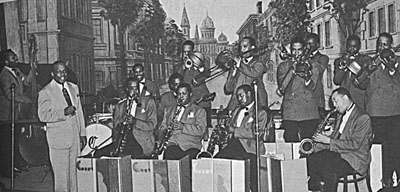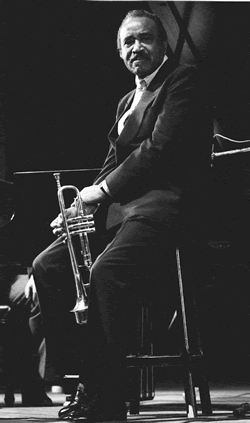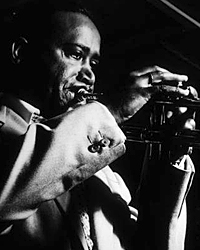Talking about his family background on stage at The Landing in 1993, Harry 'Sweets' Edison, said “Schultz doesn’t sound like a black family name but my mother was a Schulz, and there were so many Schultzes in one little town in Kentucky that it became known as Schultztown.” His father was a Zuni Indian.
His parents separated with Harry was a baby. Growing up with his aunt and uncle on a farm near Beaver Dam, Kentucky, young Harry Edison weeded the garden, watered the horses and delivered newspapers—on horseback. His uncle taught him the rudiments of music and insisted that he play the family pump organ every day. His uncle organized a band and traveled the countryside playing Sousa marches at church fairs and picnics.
'Sweets' and Louis
One day Harry discovered that
his uncle had a banged-up old
York cornet, and he was
immediately fascinated with the
instrument. Harry got the valves
working, ordered a new
mouthpiece by mail, and with his
uncle’s help, began to play his
first horn.

The Count Basie Band, 1940, Apollo Theatre, NY Harry 'Sweets' Edison (back row, 2nd from right). Photo by M. Smith from The Big Bands by George T. Simon
At eight years old, Harry was too young to be allowed inside, so he’d stand out on the pavement in front of the local dance hall and listen to the music coming from a couple of banjos, a washboard and a washtub bass. Soon he was listening to recordings by the great blues singers Blind Lemon Jefferson and Bessie Smith.
Then lightning struck. Harry was 12 years old, listening to a Bessie Smith record when he heard Louis Armstrong play trumpet for the first time. He fell in love with the sound. Harry knew he'd make the trumpet his life’s work.
Finding a Note in the Basie
Band
Harry Edison was 23 when
he joined The Count Basie
Band right before Christmas in
1937. Like Billie Holiday,
Harry's nickname was given
to him by Basie saxophone legend
Lester Young. Edison said,
"Lester had a flare for giving a
nickname, and it usually stuck.
I was elated that a man as great
as Lester Young nicknamed me,
'Sweets.' I love to eat anything
sweet, it's true, and I like to
play with a sweet quality,
but I never asked Lester why he
gave me my name."
Unlike other bands in the Swing Era, the Basie band didn't rely on written arrangements. Edison explains how this approach made for a unique sound:
"The big bands had arrangements, the great Duke Ellington, Tommy Dorsey, Jimmy Dorsey, Benny Goodman—all the bands had music written out. You would have eight bars to play a solo, then you had to sit down and play the written arrangement. We didn’t have much written music in the Basie Band, so everybody played solos. I think that’s the reason why so many great soloists came out of The Count Basie Band. We weren’t good readers anyway, that included Count Basie, so we just had a ball."
Every night we'd play tunes I never heard of before, and I would try to find a note, and never could find a note. I got sort of disturbed and I told Basie I was going to quit. He said, "Well, you sound good." I said, "But there’s no written music and I want to learn how to read." He said, "Well, you sound wonderful. If you find a note tonight, play the same, damn note every night." I did what he told me —and kept on doing it for about twenty years."
Sweets and Sinatra
Sweets Edison left the Basie
Band in 1950 and began a new
career as a freelancer that made
him one of the most sought after
session musicians in the
business, often working two
or three recording sessions a
day. He played on movie
soundtracks (Lady Sings the Blues, Houseboat), he
performed in television studio
bands (Hollywood Palace, The
Rosemary Clooney Show) and he was the music director
for Sanford & Son.
For a decade, Sweets worked with Frank Sinatra and was famous for his signature muted trumpet commentary behind Sinatra’s recorded vocals. Edison made hit records with singing stars Nat Cole, Ella Fitzgerald and many others.
On his 1993 Riverwalk Jazz appearance, Edison spoke of the recording stars of his era: "You could always tell who was playing on a record because they all had their own sound. You would never mistake Billie Holliday or Nat Cole for any body else. Louis Armstrong, Benny Goodman— all of them had their own sound and you'd recognize it right away. All the musicians used to say they'd rather be the world’s worst 'originator' than the world’s best 'imitator'."
This week on Riverwalk Jazz, Harry 'Sweets' Edison delivers his original sound, captured live at The Landing with The Jim Cullum Jazz Band. Harry Edison died in 1999 at the age of 83. The cast and crew of Riverwalk Jazz feel fortunate for time spent with the unmistakable genius of Sweets Edison and are happy to present the document of this radio show.
Photo credit for home page teaser image: Harry ‘Sweets’ Edison. Photo courtesy padovajazzclub.blogspot.com
Text based on Riverwalk Jazz script by Margaret Moos Pick ©2009




